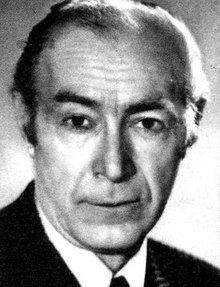Nikolai Grinko
Nikolai Grinko | |
|---|---|
 | |
| Born | Mykola Hryhorovych Hrynko 22 May 1920 |
| Died | 10 April 1989 (aged 68) |
| Nationality | Ukrainian |
| Occupation | Actor |
| Years active | 1946–1989 |
Nikolai Grigoryevich Grinko or Mykola Hryhorovych Hrynko (Ukrainian: Микола Григорович Гринько; Russian: Никола́й Григо́рьевич Гринько́; 22 May 1920 – 10 April 1989) was a Soviet and Ukrainian actor.
Biography
[edit]Nikolai Grinko was born on 22 May 1920[1]) in Kherson, then in Ukrainian SSR (now Ukraine).[2] He died on 10 April 1989[1] in Kiev, Ukrainian SSR, USSR (now Ukraine).[2]
His wife was Ayshe Rafetovna Chulak-ogly (born 1932), a violinist of the State Radio and Television Symphony Orchestra of the Ukrainian SSR, a jazz-symphonic ensemble Dnepr.[3]
Career
[edit]In 1961, Mykola Hrynko switched to cinema. But at his "native" Dovzhenko Film Studio, he was not considered a "native" actor, he was filmed very little, and was not offered any leading roles. His screenplay for Ivan Franko's Stolen Happiness had been lying in the studio offices for 6 years and was put on the shelf.
Grinko is well known for his roles in the films of Andrei Tarkovsky, including: Ivan's Childhood, Andrei Rublev, Solaris, Mirror, and Stalker.[4][5]
He also starred in the 1981 film Teheran 43.
Selected filmography
[edit]- Peace to Him Who Enters (1961) − American driver
- Ivan's Childhood (1962) − Gryaznov
- Velká cesta (1963) − red brigade commander
- Shadows of Forgotten Ancestors (1965) − Vatag
- War and Peace (1966−1967, part 1, 3) − Dessalles
- Andrei Rublev (1966) − Daniil Chyorny
- Subject for a Short Story (1969) − Anton Pavlovich Chekhov
- Dangerous Tour (1969) − Andrei Maksimovich
- Solaris (1972) − Nik Kelvin, father of Kris Kelvin
- A Lover's Romance (1974) − Vice Admiral
- Adventures in a City that does not Exist (1974) − Don Quixote
- Mirror (1975) − printing house director
- Afonya (1975) − aunt
- Woodpeckers Don't Get Headaches (1975) − Mukhin's father
- The Adventures of Buratino (1976, TV Movie) − Papa Carlo
- One−Two, Soldiers Were Going... (1977) − Colonel, Konstantin's commander
- Twenty Days Without War (1977) − Colonel Aleksandrov
- Osvobození Prahy (1977) − General Omar Bradley
- Stalker (1979) − professor
- The Adventures of the Elektronic (1979, TV Mini−Series) − professor Gromov
- The Bodyguard (1979) − Nikolai Grigorievich
- The Youth of Peter the Great (1980) − Nektaryi
- At the Beginning of Glorious Days (1980) − Nektaryi
- Teheran 43 (1981) − Hermolin
- Be My Husband (1981) − Holiday–maker, husband of the theatregoer
References
[edit]- ^ a b Страница Н. Г. Гринько Archived 2016-03-04 at the Wayback Machine
- ^ a b IMDb
- ^ Интервью Айше Чулак-оглы
- ^ "Как играть гения". day.kyiv.ua (in Russian). Retrieved 26 December 2023.
- ^ Peter Rollberg (2009). Historical Dictionary of Russian and Soviet Cinema. US: Rowman / Littlefield. pp. 272–273. ISBN 978-0-8108-6072-8.
External links
[edit]- 1920 births
- 1989 deaths
- 20th-century Ukrainian male actors
- Actors from Kherson
- Communist Party of the Soviet Union members
- Recipients of the title of Merited Artist of Ukraine
- Recipients of the title of People's Artists of Ukraine
- Soviet male film actors
- Soviet World War II pilots
- Ukrainian male film actors
- Deaths from leukemia
- Burials at Baikove Cemetery
- Deaths from cancer in the Soviet Union
